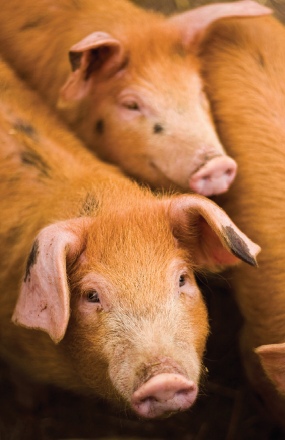Farmed animals might be the hardest-working Americans

Pigs, cows, chickens and other animals used for food might be the hardest working Americans. Most of them are on the job every day and don’t get time off or holidays. / Photo: USDA
Today, while the U.S.A. pays tribute to “the social and economic achievements of American workers,” as this federal holiday is described by the United States Department of Labor, there might be some irony in the fact that many citizens will celebrate the occasion by eating such items as hot dogs, hamburgers, chicken fajitas, and egg salad sandwiches.
Those Labor Day barbecue and picnic foods come from animals who, in light of the following quotes, might be considered to be the hardest-working Americans ever.
“Cattle production is one of the most important industries in the United States, representing 43.8 billion in cash receipts during 2009.” – United States Department of Agriculture [USDA]
“All cattle and calves in the United States as of July 1, 2012, totaled 97.8 million head.” – USDA
“21 billion gallons of milk [are] produced [by cows] in the United States each year.” – Purdue University
“The Census of Agriculture shows that the sale of milk and other dairy products in the U.S. totaled $31.8 billion in 2007 [the year of the latest census]… Milk and other dairy products accounted for 11 percent of all agricultural products sold in the U.S.” – USDA
“During 2007, U.S. sales of hogs and pigs totaled $18.1 billion… These sales accounted for 6 percent of all agricultural products sold in the United States during 2007.” – USDA
“During 2007, sales of sheep and goats and their products in the United States totaled $704.9 million. These sales accounted for 0.2 percent of all agricultural products sold in the United States during 2007.” – USDA
“From 2001 to 2010, table egg production [by hens] averaged 76 billion eggs, and the [U.S.] laying flock averaged nearly 283 million birds.” – Congressional Research Service
“In 2011, each hen averaged nearly 281 eggs, compared to 264 eggs 10 years earlier.” – Congressional Research Service
“In 2011, total egg production (including 13 billion hatching eggs) was valued at $7.4 billion.” – Congressional Research Service
“During 2007, U.S. sales of poultry and eggs totaled $37 billion…Total sales of poultry and eggs accounted for 12 percent of all agricultural products sold in the United States during 2007.” – USDA
“An estimated 95% of all eggs in the United States are produced in conventional cage systems, sometimes called battery cages. Generally, conventional cages are wire cages that may hold 6-10 laying hens, and usually have automated feeding, watering, and egg collecting systems. According to UEP [United Egg Producers], conventional cage systems typically provide each laying hen an average of 67 square inches of floor space [less than the surface of an 8.5 by 11-inch sheet of paper]. In some egg operations, hens have less space.” – Congressional Research Service
More AIR on farmed animals:
Is slaughterhouse abuse of cows surprising? Government agency has complained about it for years
Katerina Lorenzatos Makris is a career journalist, author, and editor. Credits include hundreds of articles for regional wire services and for outlets such as National Geographic Traveler, The San Francisco Chronicle, Travelers’ Tales, NBC’s Petside.com, and Examiner.com (Animal Policy Examiner), a teleplay for CBS-TV, a short story for The Bark magazine, and 17 novels for Avon, E.P. Dutton, Simon and Schuster, and other major publishers.
Together with coauthor Shelley Frost, Katerina wrote a step-by-step guide for hands-on, in-the-trenches dog rescue, Your Adopted Dog: Everything You Need to Know About Rescuing and Caring for a Best Friend in Need (The Lyons Press).
Please respect copyright law. Sharing AIR links really helps! But copying more than a couple of paragraphs of content without permission is a no-no. If you’d like to use one of AIR’s articles or one of our photographs, kindly contact us at [airinfo AT yahoo DOT com].
Copyright © 2012 Animal Issues Reporter and AnimalIssuesReporter.org.
All rights reserved.
Comprehensive and well-written article, Katerina! Thank you for your good work for (other-than-human) animals…
AS I READ THIS ARTICLE ABOUT THE HARD WORKING AMERICANS THAT WORK WITH FARM ANIMALS MY STOMACH WENT IN KNOTTS, !! THE POOR WORKERS ? NO THE POOR BLOODY ANIMALS. THEY ARE NOT EVEN TREATED WITH ANY COMPASSION OR ANY KINDNESS. THEY ARE NOT EVEN THOUGHT OF AS HAVING FEELINGS OR FEELING FEAR AND PAIN. ITS A DISGRACE AND I HATE IT. AS FOR THE HARD WORKERS “YOU CHOOSE TO WORK WITH FARM ANIMALS GET ANOTHER JOB “.